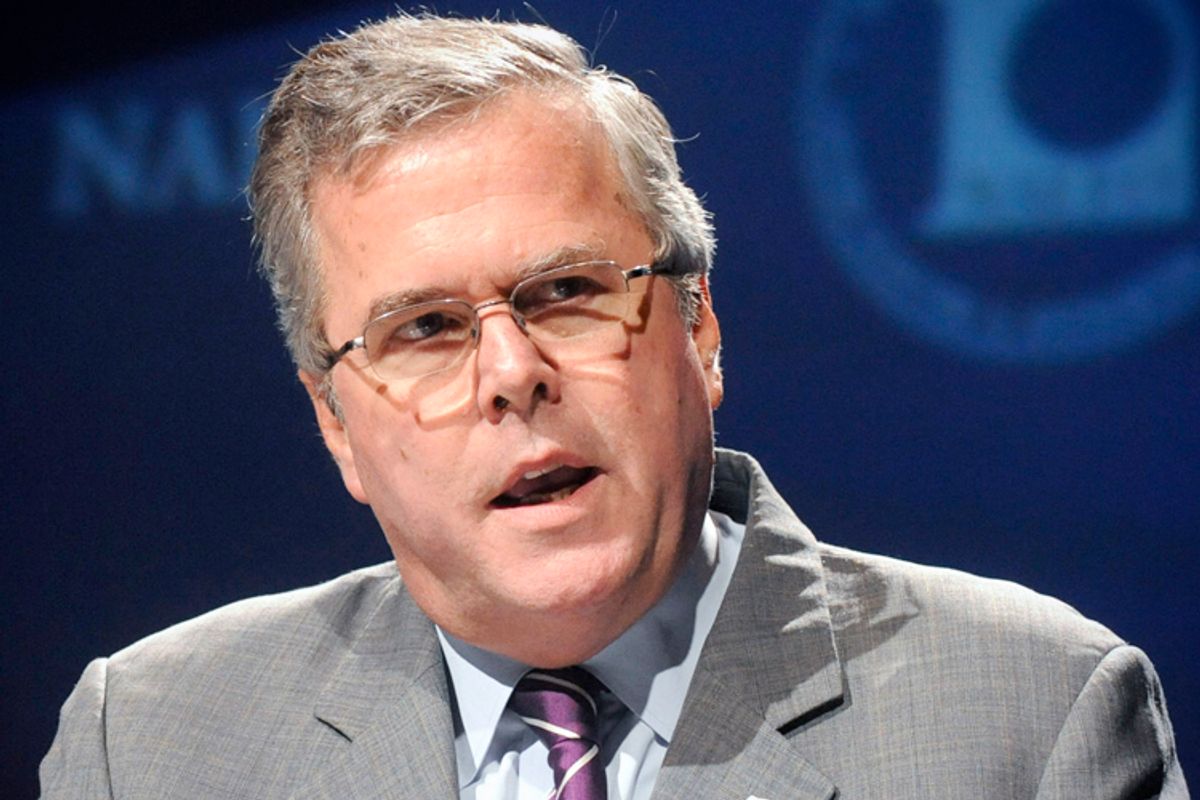Jeb Bush sent the political world into a frothy lather yesterday morning by announcing on Facebook that he is now “actively exploring” the possibly of maybe making a run for the White House in 2016. Jeb has been telling people for months that he’s “thinking” about running, but now that informal process of cogitation is apparently official. More importantly, he’s set up a PAC for the stuffed shirts of the GOP donor class to funnel their money into.
News of the announcement immediately got people wondering whether a “moderate” like Jeb Bush can win the Republican nomination. It’s an interesting question, mainly because Jeb is, by historical standards, a very conservative politician. He’s just been outpaced by much of the rest of his party, which has moved so far rightward over the past decade that once-reliable conservative standard bearers like Bush are now viewed as RINO sellouts.
Case in point: Jeb’s support for immigration reform. It’s tough to lay out just how difficult a bind Jeb Bush is in on immigration. He’s stuck fighting several battles all at once against the president, his party’s base, and his own family tree, and there’s no readily apparent way for him to win them all.
Jeb backs comprehensive immigration reform. The Republican Party writ large does not. In fact, the story of the GOP over the last decade or so has been that of a party sharpening its antagonism towards immigrant groups and whittling down its immigration policy platform to “deport them, then build a fence.” The starting point for the Republican immigration debate going into the 2016 election season has already been set by Rick Perry, who spent most of this year swaggering about as a law-and-order tough guy who militarized the Texas border and kept all the terrorists and criminals out. (Perry learned his lesson from the 2012 race, when he took tremendous grief from the right for providing in-state tuition to young undocumented immigrants.) Jeb will also probably have to contend with Ted Cruz, who favors maximum deportations; Marco Rubio, who recanted on his support for comprehensive immigration reform; and Rand Paul, who will say literally anything about immigration if it will help him politically.
One weapon they’ll use against him will be President Obama’s immigration order. When Obama announced that he was taking executive action to shield large swaths of the undocumented immigrant population from deportation, Jeb, like most Republicans, denounced the president. In doing so, however, he made clear that his objection was on procedural grounds: “Action must come in the form of bipartisan comprehensive reform passed through Congress,” he said. Hardline conservatives in Congress have made clear that “bipartisan comprehensive reform” is tantamount to “amnesty” and is not happening. Someone looking to attack Bush from the right will say that he agrees with Obama on “amnesty,” he just favors taking a different path to the same destination.
And that’s not the only problem raised by Bush’s objection to Obama’s executive action. When the White House announced the president’s order, it went to great lengths to point out that Obama’s actions have historical precedent. Specifically, they argued that Obama was following in the footsteps of two presidents, both of whom are directly related to Jeb Bush. “In 2001 President George W. Bush extended protections to as many as 150,000 Salvadorans in the United States illegally,” CNN reported last month. “And the elder Bush implemented a ‘Family Fairness’ policy to allow an estimated 1.5 million close family members of newly legalized immigrants under the sweeping 1986 immigration reform measure to avoid deportation while they applied for legal status.” Jeb argued a few days later that “they did it on a much smaller scale and they did it with consent of Congress.”
All this leaves open the question of what Jeb will do. The previous two Republican presidential nominees lurched rightward on immigration to get themselves through the primaries. Both failed to fully win over the conservative base and both alienated Hispanic voters on their way to giving their concession speeches. Jeb has already indicated that he isn’t inclined to repeat that strategy. And that makes sense because comprehensive immigration reform is an integral part of Bush’s political identity, not something that he can really fudge his stance on too much without looking like a Romney-esque opportunist who will shed portions of himself to win votes.
And that means, as Paul Waldman points out, we’re probably going to get an honest-to-goodness Republican policy debate and not a mad scramble to see who can pander the hardest to the Tea Party. What remains to be seen is whether Jeb is the sort of politician who can withstand the sort of drubbing he’s sure to take from all sides.



Shares